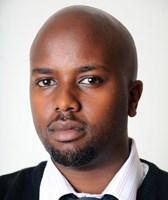Nairobi Half Life with Tosh Gitonga

How does it feel for the film to be submitted for an Oscar award?
Tosh Gitonga: It is an amazing feeling. I am still on a high.
What does this mean to Kenya's film industry?
Gitonga: It means that Kenya is recognised as a formidable film industry and exposes us well to the world. It can only be good for us.
What challenges did you face while making the film?
Gitonga: Budget constraints are always a problem. You don't have enough funds to execute what you want to. Also for this film it was difficult shooting in the real locations but we managed.
What is the objective of the film?
Gitonga: To tell a simple Kenyan story of life as it is. We choose what we want to get out of it.
How many actors are in the film and how did you select them?
Gitonga: There are over 50 actor. I personally casted, together with Kamau Wa Ndungu, all the speaking roles
How long did it take to produce the film?
Gitonga: Three weeks of pre-production and four weeks of filming.
What were some of the highs and lows of directing the movie?
Gitonga: Having to do so much in such a short time and also when we didn't have our way. Maybe a location we wanted was not available. Or we couldn't shoot a scene the way we wanted because of hazards and so on. But we connected and blended so well that it was a joy making the film. There was satisfaction everyday when we wrapped.
Was there a time you felt you wanted to give up?
Gitonga: Never! I am not that kind of person - quitting does not even come close to my thoughts.
Assuming you had another chance to redo the film, what would you change?
Gitonga: It's a difficult question. One thing about filming is that you always grow. If I did Nairobi Half Life again, it is a different time. Things cannot be the same.
You were mentored by renowned director Tom Tykwer. What did you learn from him that you used in directing the film?
Gitonga: Focus, hardwork, defining every little detail and how to be a better leader by leading by example.
The film depicts a storyline of most people around the world who chase after the "American dream". In the film, Mwas is chasing the "Nairobi dream". What makes coming to Nairobi a unique experience? Does the same reflect in other urban cities?
Gitonga: I have met a South African, Nigerian who have watched the film and the related to it. So I would say yes it does reflect other urban cities. Mwas coming to Nairobi is not unique. That's not what the story is about. It is about a journey to find oneself.
The actors speak a lot of sheng (a Swahili-based slang originating in Nairobi), what is this meant to portray?
Gitonga: It is simply the language spoken by the characters they are portraying. The film had to be as authentic as it could be.
Which is your favourite part of the movie?
Gitonga: I love everything! The whole film is a part of me!
It is every film makers dream to have his/her film nominated and win an Oscar Award. Assuming the film is nominated and wins an award, what next for you?
Gitonga: I will be right here striving to make more and more films.
Are you working on any other films?
Gitonga: Yes. Still early stages.
Joseph Wairimu, one of the actors in the film won the Best Actor award at the Durban International Film Festival. What does this mean for actors in Kenya?
Gitonga: It's a boost and a motivation. They can endeavour to look far and beyond their own limits. Open up a
What challenges face film directors, producers and actors in Kenya?
Gitonga: Systems and a formula to grow the industry. At the moment we all work as individuals. We need to come together as one because that is the way we can accomplish more.
Looking back on the experience of directing this film, what lessons have you learnt?
Gitonga: To balance leadership and direction. I am a better person and I have been exposed to the helm of it and shown how. I can only now be better.
























